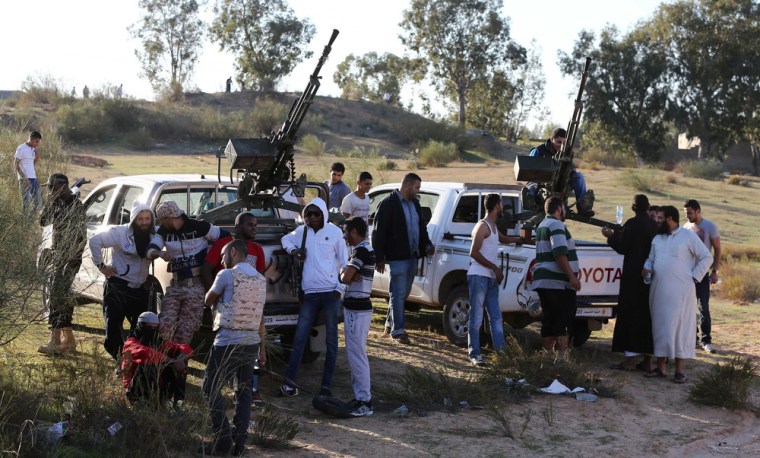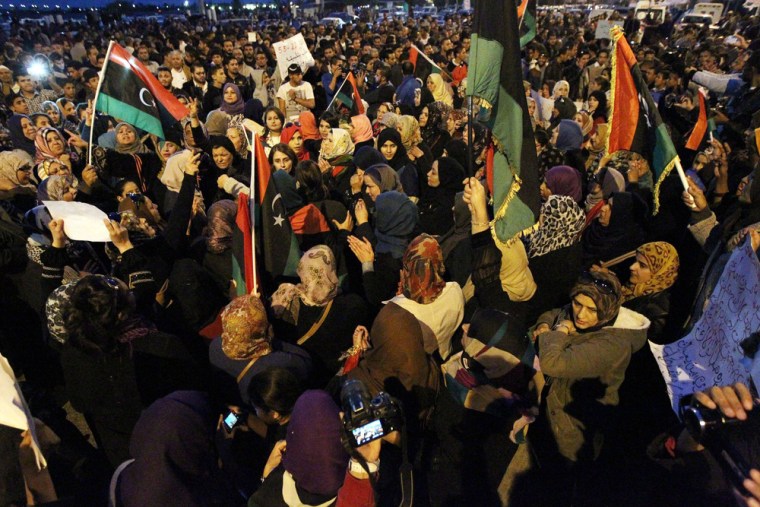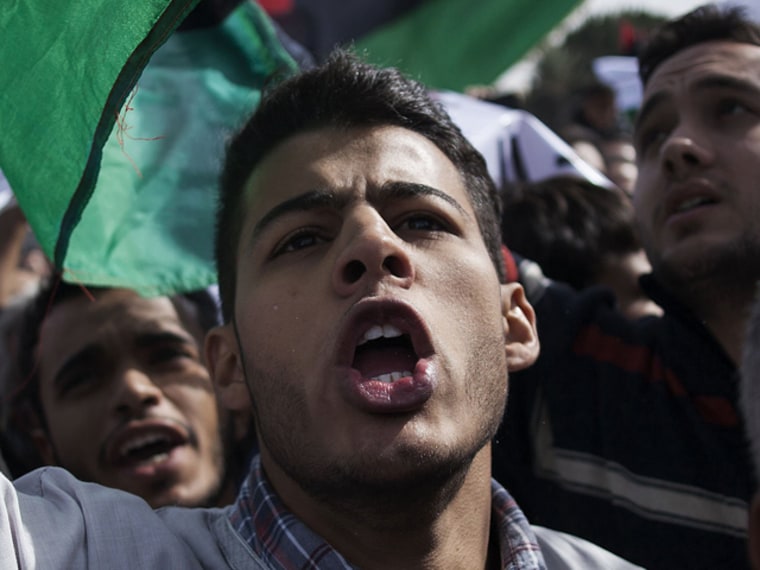More than two years since former dictator Moammar Gadhafi was ousted, Libya is still trying to take control of one of his unfortunate legacies – the proliferation of armed militias set up to fight him.
The former revolutionaries who helped knock Gadhafi from power are now plunging Libya into financial crisis by using their muscle to blockade oilfields and choke off crude shipments, sinking revenues to 20 percent, Prime Minister Ali Zeidan told reporters last week.
On Dec. 5 an American school teacher was shot dead while jogging in the eastern city of Benghazi -- also where U.S. Ambassador Chris Stevens was killed in an attack on the diplomatic mission last year.
But as Libya matures as a country, citizens are starting to take charge and stand up to the militias.
Gadhafi's legacy
“It’s a complicated situation,” added Bassem Almansuri, who served as a rebel spokesman during the push to remove Gadhafi from power. “All of them were there for the revolution of Libya. Some of them still have good intentions, to save the country and protect the elected government. Others are there to push their own agenda.”
The 26-year-old, who now lives in Libya’s capital Tripoli where he works as a computer engineer, added that people “want an army and police, not armed militias that don’t listen to the government.”
The problems facing Libya today can be traced back to Gadhafi’s 42 years in power, according to Dr. Ibrahim Sharqieh, a conflict resolution expert at the Brookings Doha Center think tank.
As a result, the government turned to militias like the Zentan and Misrata Brigades or the Tripoli Military Council to fill roles that would conventionally be carried out by an army or police force, paying many of them with state money, he added.
“This has led to two states running in parallel,” he said. “You have the official state in the elected parliament that has no power on the ground and then you have the militias who have the real power and everything is dictated by them."
Because militias are often paid by the government Sharqieh added, “Their interest in the status quo is much greater than being part of the formal state because they have their own power structures and their own finances.”

Defying state authority, some of these militias have carved out zones of power -- seizing and holding oil fields by ransom. Others have carried out torture or targeted killings. Even Zeidan was briefly kidnapped by militiamen last month.
“They were always the elephant in the room,” said Assia Amry, who moved to Tripoli last year after being raised by Libyan parents in Kentucky. “They said they were going to absorb them into the police and the army, but nobody really did anything.”
“They are very bad in Benghazi,” said Ayman, who did not give his last name out of fear of reprisals.
“The guys who fought Gadhafi thought that gave them the right to take over,” he added. “And now they will do what it takes to hold onto that.”
Standing up to militias
But that didn't stop protesters gathering near militia strongholds in recent weeks.
The government has put a December deadline on groups to join state security forces or face losing their government paychecks -- but it has not followed through on similar threats in the past.
Frustrated by a lack of action thousands marched on militia strongholds in Tripoli waving white flags and chanting, “We want an army! We want police!”
They were met with a hail of heavy machine-gun and rocket-propelled grenade fire from militiamen, who killed at least 31 and wounded more than 200.
“What happened was the government waited for the people to take action against the militias,” Almansuri said. “They are afraid of them. So it got to the point where people are sacrificing themselves to reject them and push them out.”
But Shaqueb Abara, a 32-year-old businessman from Tripoli, said it had been a turning point for many ordinary citizens and the shootings had mobilized citizens to stand up.
“People are starting to help the government,” he said. “The country is the government and the people. The government was a bit weak, but now with the support of the people they are a bit more confident and they are doing better – but the people have got to help them.”
“Gadhafi was in Libya for over 42 years and during that time he worked hard to subjugate people and clean the Libyan identity and people found themselves confused,” he added. “But after the revolution it took time to understand and people are finding themselves again.”

Amry agreed that people were used to the state taking care of everything and said they had to get used to working in a democracy.
“I did not realize how early they taught us in the U.S. how to be citizens – until I came to Libya,” she said. “(In America) you display your flag, you have to vote, you take part in society. Libyan’s aren’t like that.”
'Now we have hope'
To move forward Carlo Binda, the senior director at the Libyan office of the National Democratic Institute, an NGO that promotes democracy around the world, said there should be “serious efforts at reconciliation” like the kind seen in South Africa.
“There are communities that have a very deep animosity and they need to air their grievances in a peaceful way,” he said. “Libyans don't want anyone to do it for them, but they do want to learn about the experiences of others.”
Although politically and economically things appear to be moving slowly, everyone agreed that the country was in a much better place than it had been under Gadhafi’s rule.
“Things have changed dramatically: The community, the behavior, the thinking, the mentality, the values,” said Almansuri. “People aren’t scared, everything has changed. It has been huge transition.”
“Now we have hope," Abara added. "For the first time I think things will improve and we will go in the right way.”
Reuters and The Associated Press contributed to this report.
Related:
